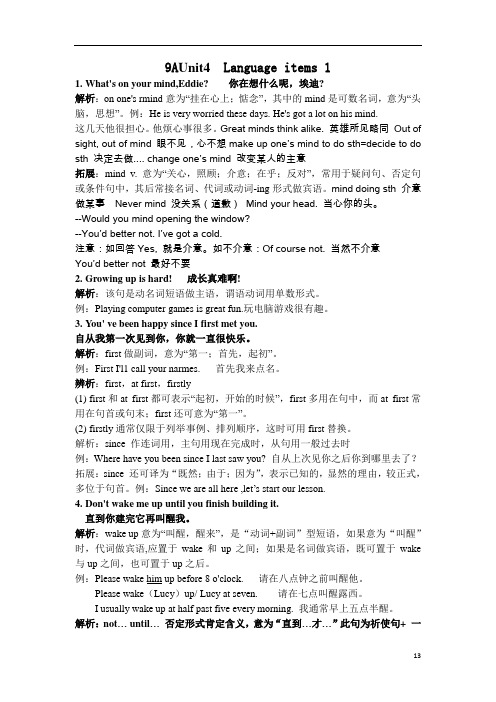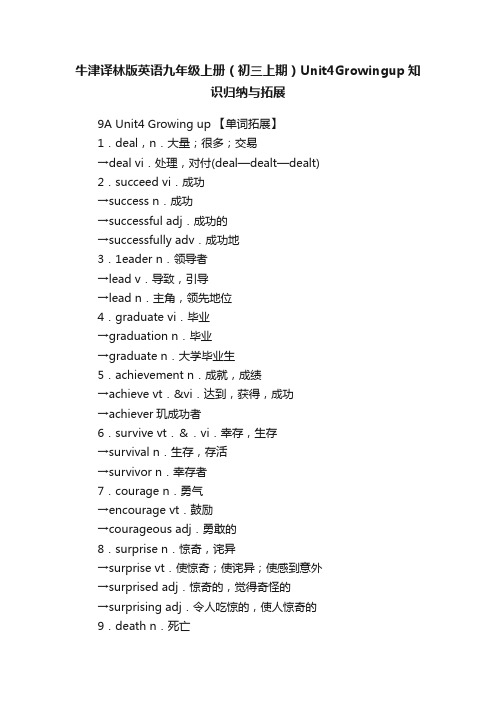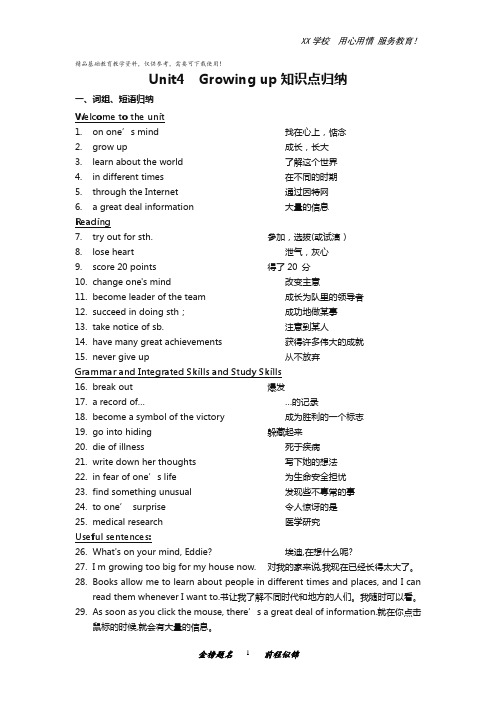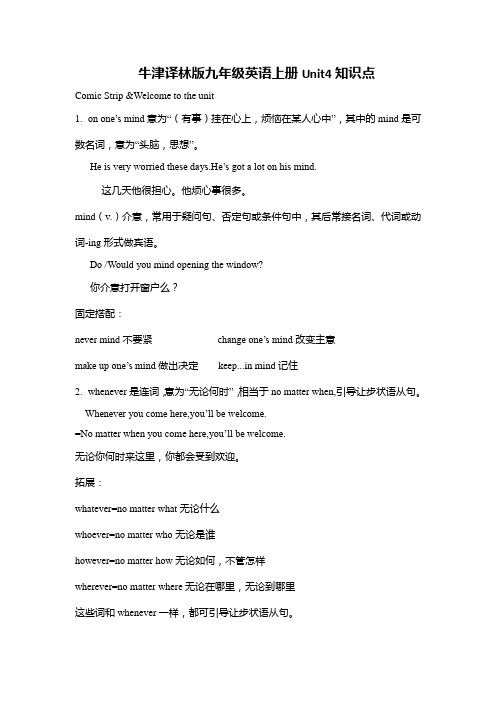初中英语 江苏专版牛津译林九年级上册 Unit 4 知识点总结
江苏专版牛津译林九年级上册 Unit 4 知识点总结

9A Unit4 Language items 11.What's on your mind,Eddie? 你在想什么呢,埃迪?解析:on one's rmind意为“挂在心上;惦念”,其中的mind是可数名词,意为“头脑,思想”。
例:He is very worried these days. He's got a lot on his mind.这几天他很担心。
他烦心事很多。
Great minds think alike. 英雄所见略同Out of sight, out of mind 眼不见,心不想make up one’s mind to do sth=decide to do sth 决定去做.... change one’s mind 改变某人的主意拓展:mind v. 意为“关心,照顾;介意;在乎;反对”,常用于疑问句、否定句或条件句中,其后常接名词、代词或动词-ing形式做宾语。
mind doing sth 介意做某事Never mind 没关系(道歉)Mind your head. 当心你的头。
--Would you mind opening the window?--You’d better not. I’ve got a cold.注意:如回答Yes, 就是介意。
如不介意:Of course not. 当然不介意You’d better not 最好不要2.Growing up is hard! 成长真难啊!解析:该句是动名词短语做主语,谓语动词用单数形式。
例:Playing computer games is great fun.玩电脑游戏很有趣。
3.You' ve been happy since I first met you.自从我第一次见到你,你就一直很快乐。
解析:first做副词,意为“第一;首先,起初”。
例:First I'l1 call your narmes. 首先我来点名。
牛津译林版英语九年级上册(初三上期)Unit4Growingup知识归纳与拓展

牛津译林版英语九年级上册(初三上期)Unit4Growingup知识归纳与拓展9A Unit4 Growing up 【单词拓展】1.deal,n.大量;很多;交易→deal vi.处理,对付(deal—dealt—dealt)2.succeed vi.成功→success n.成功→successful adj.成功的→successfully adv.成功地3.1eader n.领导者→lead v.导致,引导→lead n.主角,领先地位4.graduate vi.毕业→graduation n.毕业→graduate n.大学毕业生5.achievement n.成就,成绩→achieve vt.&vi.达到,获得,成功→achiever玑成功者6.survive vt.&.vi.幸存,生存→survival n.生存,存活→survivor n.幸存者7.courage n.勇气→encourage vt.鼓励→courageous adj.勇敢的8.surprise n.惊奇,诧异→surprise vt.使惊奇;使诧异;使感到意外→surprised adj.惊奇的,觉得奇怪的→surprising adj.令人吃惊的,使人惊奇的9.death n.死亡→die u.死,死亡→dead adj.死的→dying adj.临终的,垂死的【短语归纳】1.on your mind挂在你心上2.a great deal of information大量信息3.through the Internet通过网络4.much smaller than the other kids 比其他孩子小很多5.try out for the school team参加校队的选拔6.succeed in getting a scholarship 成功获得奖学金7.take notice of him注意到他8.graduate from high school从高中毕业9.lose their lives during the war 在战争中失去他们的生命10.be forced to move to another country 被迫移居到另外一个国家11.have her diary published(请人)出版她的日记12.admire them for their courage 因为他们的勇气佩服他们13.survive the war在战争中存活下来14.come across new words遇到生词15.in his fifties在他五十几岁时16.have some money left有些剩余的钱【句型分析】1.Do n’t wake me up until you finish building it.(P48)until,till都可以表示“一直到……为止”,引导时间状语从句,表示动作、状态的持续,常与延续性动词连用。
牛津译林九年级上学期英语知识点汇总-Unit4

精品基础教育教学资料,仅供参考,需要可下载使用!Unit4 Growing up知识点归纳一、词组、短语归纳Welcome to the unit1.on one’s mind 找在心上,惦念2.grow up 成长,长大3.learn about the world 了解这个世界4.in different times 在不同的时期5.through the Internet 通过因特网6. a great deal information 大量的信息Reading7.try out for sth. 參加,选拔(或试演)8.lose heart 泄气,灰心9.score 20 points 得了20 分10.change one's mind 改变主意11.become leader of the team 成长为队里的领导者12.succeed in doing sth;成功地做某事13.take notice of sb. 注意到某人14.have many great achievements 获得许多伟大的成就15.never give up 从不放弃Grammar and Integrated Skills and Study Skills16.break out 爆发17.a record of……的记录18.become a symbol of the victory 成为胜利的一个标志19.go into hiding 躲藏起来20.die of illness 死于疾病21.write down her thoughts 写下她的想法22.in fear of one’s life 为生命安全担忧23.find something unusual 发现些不專常的事24.to one’surprise 令人惊讶的是25.medical research 医学研究Useful sentences:26.What's on your mind, Eddie? 埃迪,在想什么呢?27.I m growing too big for my house now. 对我的家来说,我现在已经长得太大了。
牛津译林版英语九年级上册第四单元词组总结

牛津译林版英语九年级上册第四单元词组总结Unit4 growing up短语1、惦念,使担忧on one’s mind2、怎么了?(3种)What’s up? / What’s wrong? / What’s the matter?3、不用谢,别客气That’s all right. / That’s OK./ You’re welcome . / Not at all. /Don’t mention it.4、没关系,不要紧That’s all right. / Never mind . / It doesn’t matter.5、醒来/ 唤醒某人wake up / wake sb. up6、我喜欢通过旅行来了解世界。
I like to learn about the world throughtraveling.7、用那种方式去了解世界learn (about the world) that way8、在不同的时代和地方in different times and places9、大量的信息/ 从网络中学到许多a great deal of information / learn a greatdeal through the Internet10、在就读初中期间/ 在高中while attending junior high / in senior high11、参加校队/ 奥运会的选拔try out for the school team / the Olympic Games12、拒绝做某事refuse to do sth.13、灰心,失去信心lose (one’s) heart14、最后得分/ 得了20分the final score / score 20 points15、从那时起from then on16、由于身高坐在看台上sit in the stands because of his height17、使/让某人做某事(3种)make / have sb. do sth. / get sb. to do sth.18、让教练改变了他的想法get the coach to change his mind19、继续做同一件事go on (continue) doing sth.20、接着做另一件事go on (continue) to do sth.21、接着成为了球队的队长go on to become leader of the team22、被命名为年度最佳球员be named Player of the Year23、以……的名字命名name after……24、邀请他在专科院校打球invite him to play at a junior college25、带领他的队伍走向了全国冠军lead his team to the national championship26、让……引起某人的注意bring …..to the attention of sb.27、结果,所以/ 由于…… as a result / as a result of……28、注意到……/ 注意某人做某事/ 注意某人正在做某事take noticeof …….. / notice sb. do sth. / notice sb. doing sth.29、获得许多伟大的成就have (get) many great achievements30、他最引以为豪的一刻the proudest moment31、成功地得到了奖学金succeed in getting a scholarship32、大学毕业graduate from the university33、强迫某人做某事force sb. to do sth34、他被迫在另一个篮球队打球。
牛津译林版九年级英语上册Unit4知识点

牛津译林版九年级英语上册Unit4知识点Comic Strip &Welcome to the unit1.on one’s mind意为“(有事)挂在心上,烦恼在某人心中”,其中的mind是可数名词,意为“头脑,思想”。
He is very worried these days.He’s got a lot on his mind.这几天他很担心。
他烦心事很多。
mind(v.)介意,常用于疑问句、否定句或条件句中,其后常接名词、代词或动词-ing形式做宾语。
Do /Would you mind opening the window?你介意打开窗户么?固定搭配:never mind不要紧change one’s mind改变主意make up one’s mind做出决定keep...in mind记住2.whenever是连词,意为“无论何时”,相当于no matter when,引导让步状语从句。
Whenever you come here,you’ll be welcome.=No matter when you come her e,you’ll be welcome.无论你何时来这里,你都会受到欢迎。
拓展:whatever=no matter what无论什么whoever=no matter who无论是谁however=no matter how无论如何,不管怎样wherever=no matter where无论在哪里,无论到哪里这些词和whenever一样,都可引导让步状语从句。
3.through是介词,意为“以;凭借”,表示做某事的方式,相当于by.We got the news through our friend.我们通过朋友得到这个消息。
辨析:through/by,with,inThrough (prep.)表示空间上的通过,穿过。
辨析:cross/across/through/over4.as soon as意为“一...就...”,引导时间状语从句。
牛津译林版英语九年级上册第四单元知识点

九年级上册Unit4 growing up单词1.time n.时期,时代【例】The movie is set during the time of the Russian revolution.这部电影以俄国革命时期为背景。
注意:time作“时期,时代”讲时,经常用其复数形式。
ancient times古代people in different times and places不同时代和不同地方的人【拓展】time n.时间;次数2. whenever conj. 无论何时【例】You can go there whenever you want.无论你什么时候想去那里都可以。
注意:whenever相当于no matter when。
【拓展】whenever adv.究竟什么时候Whenever will you tell us the truth? 你到底什么时候告诉我们真相? 3.through prep.以,凭借【例】:She got her first job through an employment agency.她通过职业介绍所找到了她的第份工作。
through prep.穿过The sun shone through the window.太阳透过窗户照进来。
4.deal n.很多【例】In addition to leaves, these animals eat a great deal of fruit.除了树叶之外,这些动物还吃大量的水果。
a great deal (of)大量,许多注意:a great deal of后接不可数名词。
5.score v.得分【例】Our team scored five points. 我们队得了五分。
【拓展】score n.分数,成绩Mr Wang, could you tell me where I can find out the exam scores?王老师,你能告诉我在哪里能查出考试成绩吗?6. university n.大学【例】go to university上大学Is there a university in this city?这座城市有大学吗?注意:表示“上大学,读大学”时,university前通常不加冠词。
牛津译林版-英语-九上-牛津译林版九上英语 4单元 Growing up 知识点小结
Unit 4 Growing up 知识精讲一、必背词汇time n.时期,时代whenever conj.无论何时through prep.以,凭借deal adv.很多score v.得分stand n.看台leader n.领导者university n.大学simply adv.仅仅;简直national adj.国家的championship n.锦标赛,大赛succeed v.成功scholarship n.奖学金although adv.尽管,虽然graduate v.毕业force v.强迫,迫使league n.联盟,社团2remain v.逗留;保持不变prove v.证明matter v.要紧,有重大影响medal n.奖牌,奖章career n.生涯,职业against prep.与…相反record n.记录symbol n.象征victory n.胜利spirit n.幽灵;精神;灵魂unusual adj.不寻常的,不平常的cell n.细胞cancer n.癌症surprise n.惊奇,诧异research n.研究;调查death n.死,死亡2二、重点词汇1. simply adv.1). completely or as much as possible完全地;绝对地例句:You look simply (= really) beautiful in that dress.你穿那条裙子看上去真漂亮。
2). only仅仅;只不过例句:I don't like my job - I simply do it for the money.我不喜欢自己的工作——我纯粹是为了钱才干的。
2. force v.1). to make something happen or make someone do something difficult, unpleasant, orunusual, especially by threatening or not offering the possibility of choice强迫,迫使例句:I really have to force myself to be nice to him.我确实得要强迫自己才能做到对他和颜悦色。
牛津英语译林版九年级上册 9A Unit4 知识点归纳总结
★7.through (prep) 以、凭借 后接名词或代词
(prep) 穿过
穿过 through the city/ the tunnel/ the clouds/ the forest/the
door/the window/ the hole
China. eg.上海比日本的城市大。
Shanghai is bigger than all the cities/any city in Japan.
3. While attending junior high, Spud tried out for the
school team, but he was rufused at first... (1) attend junior high 上初中 attend 参加,出席
attend a meeting/a wedding/a class/a lesson/a report/school join 参加组织 =be in/a member of... join a club/a team/a group/the Party党/a trip/the army
join sb/join sb in doing take part in= join in 参加活动 (+activities/a party) ★(2) try out for sth 参加……选拔(或试演)
D.through, by
★8.As soon as you click the mouse, there’s a great deal of information.
(1) as soon as 一……就,引导时间状语从句。主句是一 般将来时,则从句常用一般现在时,主句过去时,从句 也用过去时。
初中英语 江苏专版牛津译林九年级上册 Unit 4 知识点总结
译林版九上U4知识点总结1.What's on your mind,Eddie? 你在想什么呢,埃迪?解析:on one's rmind意为“挂在心上;惦念”,其中的mind是可数名词,意为“头脑,思想”。
例:He is very worried these days. He's got a lot on his mind.这几天他很担心。
他烦心事很多。
拓展:mind v. 意为“关心,照顾;介意;在乎;反对”,常用于疑问句、否定句或条件句中,其后常接名词、代词或动词-ing形式做宾语。
例:Do / Would you mind opening the door? 请你把门打开好吗?固定搭配:含mind的短语never mind不要紧keep ... in mind 记住....change one's mind 改变主意make up one's mind 做出决定2.Growing up is hard! 成长真难啊!解析:该句是动名词短语做主语,谓语动词用单数形式。
例:Playing computer games is great fun.玩电脑游戏很有趣。
3.You' ve been happy since I first met you.自从我第一次见到你,你就一直很快乐。
解析:first做副词,意为“第一;首先,起初”。
例:First I'l1 call your narmes. 首先我来点名。
辨析:first,at first,firstly(1)first和at first都可表示“起初,开始的时候”,first多用在句中,而at first常用在句首或句末;first还可意为“第一”。
(2)firstly通常仅限于列举事例、排列顺序,这时可用first替换。
4.Don't wake me up until you finish building it.直到你建完它再叫醒我。
牛津译林版九年级英语上册Unit4 Growing up 单元知识梳理
九上Unit4 单元知识梳理Welcome to the unit1.worry (v.) 担心-----worried (adj.)担心的look worried 看上去担心的2.Growing up is hard. Growing是动名词做主语。
3.not... until... 直到...才 e.g I didn’t finish my homework until my father came home.4.allow sb to do -------(被动) sb be allowed to do . e.g Students aren’t allowed to smoke.5.o n one’s mind 挂在心上 e.g My study is always on my mind.Reading1.high (adj)------height ( n.) the height of...2.because +从句because of + 单词或短语3.even harder 甚至更努力even, a little,far,much等可修饰比较级,但very 不可。
4.simple (adj.)简单-------simply (adv.) 简直;简单地 e.g His drawing is simply terrible.The problem is simple to solve.5.lead (v.)领导,带领------leader(n.)领导者lead sb to... Hard work leads us to success.6.success(n.)-------successful(adj.)-------successfully(adv.)--------succeed(v.)(succeeded,~)succeed in doing He succeeded in passing the exam.7.be named 被命名为 e.g Hanhan is named one of the best writers in China now.8.force sb to do--------(被动) sb be forced to do. e.g Jim is often forced to do lots of work.(注:make sb do)9.achieve (v)(通过努力)达到,取得----achievement(n.)成就(可数)E.g Finally, they achieved success. We are proud of your achievements.10.through (1) 通过... (2)从...内部穿过11.by (1)通过...方法(2) 被... (用于被动)(3) 靠近...主要对比两者的第一个意思,through作为通过来说,通常后接名词,by 作为通过来说,通常后接doing.12.matter (1) (v.) 要紧,有重大影响e.g It doesn’t matter which one you choose.(2) (n.) 事情,问题 e.g What is the matter ?13.sb be refused to do(被动) e.g Tom was refused to join us. Grammar1. before, after 的用法(1) before “在…之前”,表示主句动作发生在从句动作之前。
- 1、下载文档前请自行甄别文档内容的完整性,平台不提供额外的编辑、内容补充、找答案等附加服务。
- 2、"仅部分预览"的文档,不可在线预览部分如存在完整性等问题,可反馈申请退款(可完整预览的文档不适用该条件!)。
- 3、如文档侵犯您的权益,请联系客服反馈,我们会尽快为您处理(人工客服工作时间:9:00-18:30)。
译林版九上U4知识点总结1.What's on your mind,Eddie? 你在想什么呢,埃迪?解析:on one's rmind意为“挂在心上;惦念”,其中的mind是可数名词,意为“头脑,思想”。
例:He is very worried these days. He's got a lot on his mind.这几天他很担心。
他烦心事很多。
拓展:mind v. 意为“关心,照顾;介意;在乎;反对”,常用于疑问句、否定句或条件句中,其后常接名词、代词或动词-ing形式做宾语。
例:Do / Would you mind opening the door? 请你把门打开好吗?固定搭配:含mind的短语never mind不要紧keep ... in mind 记住....change one's mind 改变主意make up one's mind 做出决定2.Growing up is hard! 成长真难啊!解析:该句是动名词短语做主语,谓语动词用单数形式。
例:Playing computer games is great fun.玩电脑游戏很有趣。
3.You' ve been happy since I first met you.自从我第一次见到你,你就一直很快乐。
解析:first做副词,意为“第一;首先,起初”。
例:First I'l1 call your narmes. 首先我来点名。
辨析:first,at first,firstly(1)first和at first都可表示“起初,开始的时候”,first多用在句中,而at first常用在句首或句末;first还可意为“第一”。
(2)firstly通常仅限于列举事例、排列顺序,这时可用first替换。
4.Don't wake me up until you finish building it.直到你建完它再叫醒我。
解析:wake up意为“叫醒,醒来”,是“动词+副词”型短语,如果是代词做宾语,应置于wake和up之间;如果是名词做宾语,既可置于wake与up之间,也可置于up之后。
例:Please wake him up before 8 o'clock. 请在八点钟之前叫醒他。
Please wake up Lucy at seven. 请在七点叫醒露西。
5.Books allow me to learn about people in different times and places, and I can read them whenever I want to.书让我了解不同时期和地点的人们,而且无论什么时候我想读书都能读。
解析:1、time是可数名词,意为“时期,时代”,常用复数形式,in different times 在不同的时期。
例:Here are some cars in different times in Germany.这里是一些德国不同时期的汽车。
拓展:time n.时间(不可数名词);次数(可数名词);倍数(可数名词)。
例:I have no time to chat with you now. 我现在没时间和你谈。
How many times have you read the text? 这篇课文你读了几遍了?2、whenever 是连词,意为“无论何时”。
例:Come and visit me whenever you want.你想什么时候来看我就来吧。
拓展:whenever adv. 不论何时,随时。
6.I like to learn about the world through the Internet.我喜欢通过因特网来了解世界。
解析:through是介词,意为“以,凭借”,表示做某事的方式。
相当于by.例:I heard about it through a friend.我是通过一个朋友听说此事的。
辨析:through,across一言辨异:We were walking through the forest while they were swimming across the river.我们穿过森林的时候,他们正游过河。
7.As soon as you click the mouse, there's a great deal of information.你一点击鼠标,就会有大量的信息。
解析:as soon as意为“一...就”,常用来引导时间状语从句。
例:I'l1 call you as soon as I get there. 我一到那里就给你打电话。
注意:在as soon as,when,after,before,until等引导的时间状语从句中,应用一般现在时表示将要发生的动作,主句用一般将来时。
8.He was very small --- much smaller than the other kids at school.他很矮小---比学校里的其他孩子要矮不少。
解析:much用于比较级之前,意为“......得多”。
例:He is much taller than me. 他比我高得多。
拓展:比较级前的修饰语:1.a little/a bit 一点儿,稍微2. much,a lot,far ....得多3. even,still 更....4. any,no 略微,稍微;没有(用于疑问句或否定句中)例:Tom is a little/bit taller than Peter. 汤姆比彼得稍微高点儿。
In winter,the weather in Hainan is much/ far warmer than that in Beijing.在冬季,海南的天气比北京暖和得多。
9.He did not lose heart. 他没有灰心。
解析:lose意为“失去,丢失”,lose heart意为“失去信心,灰心,泄气”。
例:He has failed in the exams recently and he seems to lose heart.最近他考试失利,他似乎要泄气了。
固定搭配:lose heart失去信心;lose one's way迷路;lose oneself in/be lost in陶醉于,埋头于;lose interest in对.....失去兴趣lose one's life失去生命;lose one's voice 失声,嗓子哑;lose face 丢面子;lose one’s job失业10.When he finally got the chance,he scored 20 points in his first game.当他最后得到机会时,他在首场比赛中就得了20分。
解析:finally是副词,意为“最后,终于”,相当于in the end。
例:Finally, she left the classroom without telling anyone.最后,她没有告诉任何人就离开了教室。
拓展:final adj. 最后的,最终的。
例:This is a final result. 这是最后的结果。
辨析:finally,at last,in the end11.In senior high, Spud often had to sit in the stands because of his height.在高中,斯巴德经常因为身高问题不得不坐在看台上。
解析:--- because of 意为“因为,由于”,其后可接名词、代词或动词-ing形式。
例:I was late for school because of the bad weather.由于天气恶劣,我上学迟到了。
注意:because of之后不可接从句,应用because引导原因状语从句。
--- height是名词,意为“高,高度”。
例:What is your height? = How tall are you? 你多高?拓展:tall adj.高的;high adj. & adv. 高的;高地。
辨析:tall,high一言辨异:A tall man is standing on the high wall.一个高个子男人正站在高高的墙上。
12.Spud went on to become leader of the team.斯巴德接着成为了队长。
解析:1,go on to do sth意为“接着做另一件事”。
例:He fnished his homework and went on to watch TV.他完成了作业,接着看电视。
辨析:go on to do sth,go on doing sth,go on with sth(1)go on to do sth意为“接着做某事,强调一件事做完后,接着做另一件事。
”例:He stopped to have a look,and then went to read his book.他停下来看了看,然后接着看他的书。
(2)go on doing sth与go on with sth的含义相似,意为“继续做某事”,指一直不停地做同样一件事,with后接的是要做的事本身。
例:He went on doing his homework.= He went on with his homework. 他继续做作业。
2,leader 是可数名词,意为“领导者”。
例:His air of confidence makes him a natural leader.他那自信的神态显得他天生就是一个领导人。
拓展:lead vt. 领导,带领。
例:She took her son by the hand to lead him into the house.她拉着她儿子的手带领他进了那所房子。
固定搭配:lead a...life 过着。
的生活;lead sb into/to引领/带领某人lead sb (in) doing sth 领导某人做某事;lead sb to do sth引导某人做某事;lead to导致,导向,引起13.Although he was a great player at university, the NBA was not interested in him because all its players were more than 20 cm taller than he was.尽管他在大学是一位优秀球员,但是NBA对他不感兴趣,因为所有的NBA球员都比他高超过20厘米。
